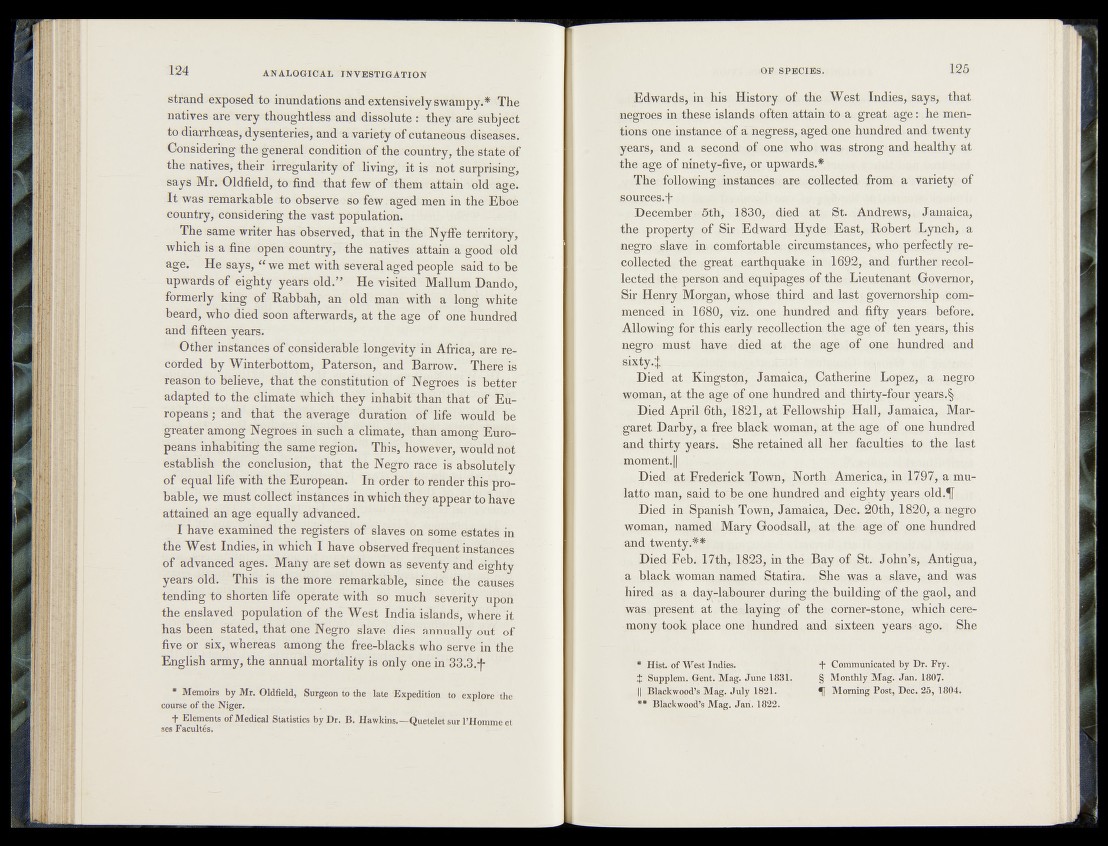
strand exposed to inundations and extensively swampy.* The
natives are very thoughtless and dissolute : they are subject
to diarrhoeas, dysenteries, and a variety of cutaneous diseases.
Considering the general condition of the country, the state óf
the natives, their irregularity of-living, it is not surprising,
says Mr. Oldfield, to find that few of them attain old age.
I t was remarkable to observe so few aged men in the Eboe
country, considering the vast population.
The same writer has observed, that in the Nyffe territory,
which is a fine open country, the natives attain a good old
age. He says, “ we met with several aged people said to be
upwards of eighty years old.” He visited Mallum Dando,
formerly king of Rabbah, an old man with a long white
beard, who died soon afterwards, at the age of one hundred
and fifteen years".
Other instances of considerable longevity in Africa, are recorded
by Winterbottom, Paterson, and Barrow. There is
reason to believe, that the constitution of Negroes is better
adapted to the climate which they inhabit than that óf Europeans
; and th a t the average duration of life would'be
greater among Negroes in such a climate, than among Europeans
inhabiting the same region. This, however, would not
establish the conclusion, that the Negro race is absolutely
of equal life with the European. In order to render this probable,
we must collectinstanees in which they appear to havé
attained an age equally advanced.
I have examined the registers of slaves on some estates in
the West Indies,, in which I have observed frequent instances
of advanced ages. Many are Set down as seventy and eighty
years old. This is the more remarkable, sinde" the causes
tending to shorten life operate with so much Severity upon
the enslaved population of the West India islands, where it
has been stated, th a t One Negro slave dies annually out of
five or six, whereas among the free-blacks who serve in the
English army, the annual mortality is only onein 33.3,-f*
* Memoirs by Mr. Oldfield, Surgeon to the late Expedition to explore the
course of the Niger.
+ Elements of Medical Statistics by Dr. B. Hawkins.—Quetelet sur l’Homme et
ses Facultés.
Edwards, in his History of the West Indies, says, that
negroes in these islands often attain to a great, age he mentions
one instance of a negress, aged one hundred and twenty
years, and a second of one who was strong and healthy at
the age of ninety-five, or upwards.*
The following instances are collected from a variety of
sources.f
December-5th, 1830, died at St. Andrews,, Jamaica,
the property of Sir Edward Hy,d„e East, Robert Lynch,. a
negro slave in, comfortable, circun^stances, who perfectly*recollected
the .great earthquake in ,1^ 2? and further recollected
the person and equipages of th e , Lieutenant Governor,
Sir Henry Morgan, whose third and last, governorship commenced
in 1680,..viz; one hundred; and fifty years, before.
Allowing for this early recollection the age of ten years,, this
negro must have died at the age of one. hundred and
si*ty4 ---- 1;,„. >,V;; V , r , r
Died at Kingston, Jamaica, Catherine Lopez,,: a negro
woman, at the,age of one hundred and thirty-four .years.
Died April 6th, 1821:, at Fellowship Hall, Jamaica, Margaret
Darby, a free black woman, at the age, of. ope hundred
and thirty years. She retained,all, her faculties to .,th e la st
moment;||
Died a t Frederick Town, North America, in 1797J#. a; mu-
latto man, said .torbe one hundred and eighty years.$Xd*5F%fi
Died in Spanish Town, Jamaica, Dec. 20th, 1820,; a.negro,
woman, named Mary Goodsall,: at the age of one hundred
and twenty.!*
Died Feb. 17th,„ 1,823, in the,; Bay o f^ i^ John’s# Antigua,
a black woman named Statira. She was , a sl-aye# and was
hired as a dayrlabourer during the building, of the gaol, and
was, present, at the laying of the corner-stone, which.ceremony
took place one hundred and sixteen y earsr ago;.f| Sjhe
* Hist of West Indies.
$ Supplem. Gent. Mag. June 1831.
|| Blackwood’s Mag. July 1821.
** Blackwood’s Mag. Jari, 1822.
Communicated by Dr. Fry.
§ Monthly.Mfàg. Jan. 1807-
Morning Post, Dec. 25, 1804.